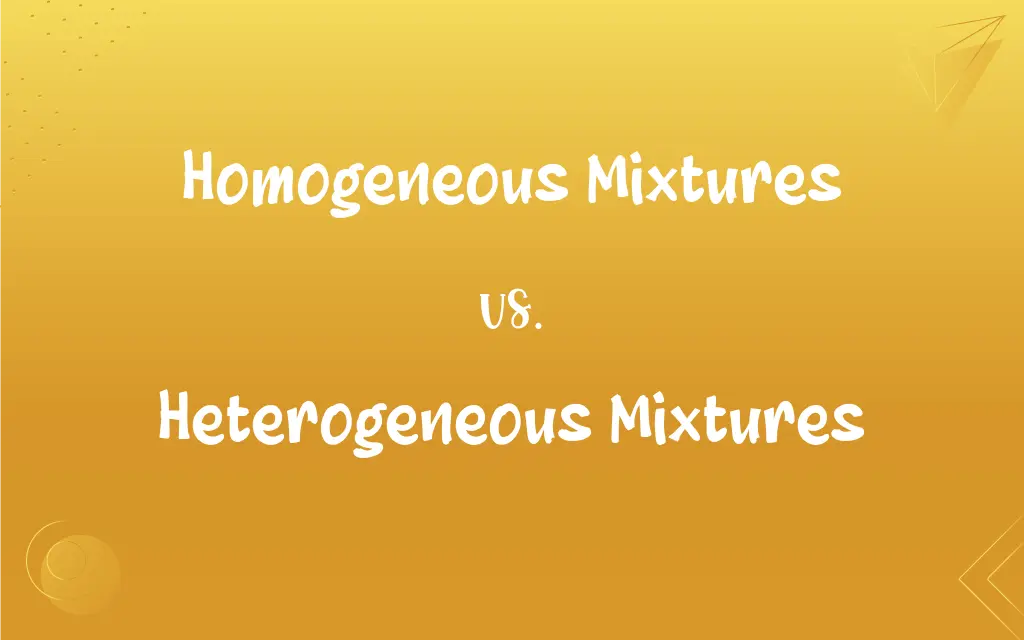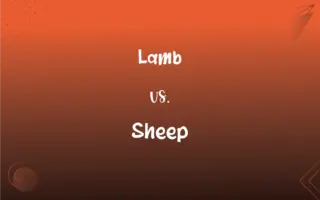Homogeneous Mixtures vs. Heterogeneous Mixtures: What's the Difference?
Edited by Harlon Moss || By Janet White || Updated on October 29, 2023
Homogeneous mixtures are uniform in composition, while heterogeneous mixtures consist of visibly different substances or phases.

Key Differences
Homogeneous mixtures are known for their single-phase composition, meaning the mixture is consistent throughout. Conversely, heterogeneous mixtures contain different phases, which are discernible as separate substances.
In homogeneous mixtures, the substances present are evenly distributed, making it difficult to differentiate one component from another. However, in heterogeneous mixtures, the substances are not evenly distributed, allowing for the individual components to be visibly distinguishable.
The term "solution" is often used synonymously with homogeneous mixtures, as the solute's particles are uniformly dispersed within the solvent, whereas heterogeneous mixtures can include colloids and suspensions, where particles are not completely dissolved and can be observed under a microscope or with the naked eye.
The properties of homogeneous mixtures, such as density, concentration, and refractive index, are uniform throughout. In contrast, these properties in heterogeneous mixtures can vary within the sample.
Separation techniques for homogeneous mixtures are often more complex, requiring methods like distillation. For heterogeneous mixtures, components can often be separated through mechanical means like filtration.
ADVERTISEMENT
Comparison Chart
Composition
Uniform, not distinguishable
Non-uniform, distinguishable
Phases
Single-phase
Multiple phases
Examples
Salt dissolved in water
Sand in water
Physical Properties
Consistent throughout
Vary within the mixture
Separation Techniques
Distillation, chromatography
Filtration, mechanical separation
ADVERTISEMENT
Homogeneous Mixtures and Heterogeneous Mixtures Definitions
Homogeneous Mixtures
A single-phase blend of substances that are indistinguishable from one another.
Alloys like steel are homogeneous mixtures of metals.
Heterogeneous Mixtures
Mixtures consisting of visibly different substances or phases.
A salad dressing of oil and vinegar is a classic example of a heterogeneous mixture.
Homogeneous Mixtures
Solutions with a uniform composition throughout.
The saline solution, a type of homogeneous mixture, is used in medical treatments.
Heterogeneous Mixtures
Mixtures that contain particles that are large enough to be seen and separated from one another.
A mixture of oil and water forms two separate layers, indicating it is a heterogeneous mixture.
Homogeneous Mixtures
Mixtures that are consistent in their visual appearance and properties.
The air we breathe is a homogeneous mixture of gases.
Heterogeneous Mixtures
Substances where components can typically be separated by simple mechanical methods.
The particles in a sand and water mixture can be separated by filtration, classifying it as a heterogeneous mixture.
Homogeneous Mixtures
Combinations where the solute completely dissolves in the solvent.
Sugar completely dissolves in warm water, forming a homogeneous mixture.
Heterogeneous Mixtures
Combinations where the individual substances are distinguishable.
Concrete is a heterogeneous mixture of cement, sand, and gravel.
Homogeneous Mixtures
Mixtures that maintain uniformity even at the molecular level.
The mixture of alcohol and water is homogeneous because it looks uniform, even under a microscope.
Heterogeneous Mixtures
Mixtures in which the components do not have uniform composition and properties.
A bowl of cereal with milk contains solids and liquids, making it a heterogeneous mixture.
FAQs
Are the properties of heterogeneous mixtures consistent throughout?
No, properties like density or boiling point can vary.
Are all solutions homogeneous mixtures?
Most are, as the solute is evenly distributed.
Can the components in homogeneous mixtures be distinguished?
Generally, no, they appear as a single substance.
Do heterogeneous mixtures have uniform composition?
No, their composition is visibly non-uniform.
What's an example of a heterogeneous mixture?
Oil and water, as they don't mix uniformly.
How can you separate a heterogeneous mixture?
Through methods like filtration or decanting.
Can homogeneous mixtures be separated?
Yes, through methods like distillation or chromatography.
Can phases be observed in homogeneous mixtures?
No, homogeneous mixtures typically have a single phase.
Is saltwater a homogeneous or heterogeneous mixture?
It's a homogeneous mixture because the salt is evenly distributed.
Is air a homogeneous mixture?
Yes, its components are uniformly mixed.
Do homogeneous mixtures scatter light?
Typically, no, unlike colloids in heterogeneous mixtures.
Can you provide an example of a homogeneous mixture?
A sugar-water solution is a common example.
Can you see the different components in a heterogeneous mixture?
Often, yes, the components are visually distinguishable.
Are colloids homogeneous or heterogeneous?
They're considered heterogeneous mixtures.
Do homogeneous mixtures require a solvent?
They often do, especially in solutions.
Are alloys homogeneous mixtures?
Generally, yes, as metals are uniformly blended.
Are suspensions homogeneous or heterogeneous?
Heterogeneous, as particles settle over time.
What's the main visual difference between homogeneous and heterogeneous mixtures?
Homogeneous are uniform, heterogeneous are not.
Are the components of a heterogeneous mixture evenly distributed?
No, they can often be unevenly distributed.
What type of mixture is a salad?
It's heterogeneous, as you can see the different ingredients.
About Author
Written by
Janet WhiteJanet White has been an esteemed writer and blogger for Difference Wiki. Holding a Master's degree in Science and Medical Journalism from the prestigious Boston University, she has consistently demonstrated her expertise and passion for her field. When she's not immersed in her work, Janet relishes her time exercising, delving into a good book, and cherishing moments with friends and family.
Edited by
Harlon MossHarlon is a seasoned quality moderator and accomplished content writer for Difference Wiki. An alumnus of the prestigious University of California, he earned his degree in Computer Science. Leveraging his academic background, Harlon brings a meticulous and informed perspective to his work, ensuring content accuracy and excellence.































































